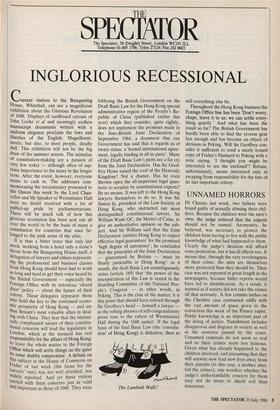THE
SPECTATOR
The Spectator, 56 Doughty Street, London WC1N 2LL Telephone 01-405 1706; Telex 27124; Fax 242 0603
INGLORIOUS RECESSIONAL
Current visitors to the Banqueting House, Whitehall, can see a magnificent exhibition about the Glorious Revolution of 1688. Displays of cardboard cutouts of John Locke et al and seemingly endless manuscript documents written with a uniform elegance proclaim the laws and liberties of the English. Magnificent, surely; but also, to most people, deadly dull. This exhibition will not be the big draw of the summer season. The minutiae of constitution-making are a passion of very few today — although often of sup- reme importance to the many in the longer term. After the event, however, everyone wants to cash in. The addresses com- memorating the tercentenary presented to the Queen this week by the Lord Chan- cellor and Mr Speaker in Westminster Hall were no doubt received with a lot of Puffed-up pride by parliamentarians. There will be much talk of how this glorious revolution has been sent out all over the world to be the basis of many a constitution for countries that once be- longed to the pink areas of the atlas. It is thus a bitter irony that only last week, working from a hotel only a stone's throw from the Banqueting House itself, a delegation of lawyers and others represent- ing the professional and business classes from Hong Kong should have had to work so long and hard to get their voice heard by the British Government — especially the Foreign Office with its notorious 'closed door' policy — about the future of their colony. These delegates represent those who hold the key to the continued econo- mic prosperity of Hong Kong — and are thus Britain's most valuable allies in deal- ing with China. They fear that the intrinsi- cally complicated nature of their constitu- tional concerns will lead the legislature in London, which at the moment has real responsibility for the affairs of Hong Kong, to leave the whole matter to the Foreign Office which will settle things on the quiet by some shabby compromise. A debate on this subject in the House of Commons on Friday of last week (the focus for the lawyers' visit) was not well attended, nor widely reported. And yet these visitors carried with them concerns just as valid and important as those of 1688. They were lobbying the British Government on the Draft Basic Law for the Hong Kong special administrative region of the People's Re- public of China (published earlier this year) which they consider, quite rightly, does not implement the promises made in the Sino-British Joint Declaration of September 1984, a document that our Government has said that it regards as of treaty status: a 'formal international agree- ment, legally binding in all its parts'. Many of the Draft Basic Law's parts are a far cry from the Joint Declaration. Has Sir Geof- frey Howe raised the roof of the Heavenly Kingdom? Not a chance. Has he even thrown open the all-important legal ques- tions to scrutiny by constitutional experts? By no means. It was left to the Hong Kong lawyers themselves to do so. It was Mr Simon Ip, president of the Law Society of Hong Kong, who instructed our most distinguished constitutional lawyer, Sir William Wade QC, the Master of Caius, to give an authoritative opinion on the sub- ject. And Sir William said that the Joint Declaration 'entitles Hong Kong to expect effective legal guarantees' for the promised `high degree of autonomy'; he concluded that the principles of the Joint Declaration — guaranteed by Britain — 'must be finally justiciable in Hong Kong': as it stands, the draft Basic Law unambiguously states (article 169) that 'the power of the interpretation of this Law is vested in the Standing Committee of the National Peo- ple's Congress' — in other words, in Peking. This is the crux of the matter; it is this point that should have echoed through Sir Geoffrey's head — himself a lawyer as the rolling phrases of self-congratulatory prose rose to the rafters of Westminster Hall during the 1688 junket. If the legal basis of the final Basic Law (the 'constitu- tion' of Hong Kong) is defective, then so The Lambeth Walk? will everything else be.
Throughout the Hong Kong business the Foreign Office line has been 'Don't worry, chaps, leave it to us; we can settle every- thing quietly.' And what has been the result so far? The British Government has hardly been able to find the reverse gear fast enough and has become an object of derision in Peking. Will Sir Geoffrey con- sider it sufficient to send a nicely ironed copy of Friday's Hansard to Peking with a note saying, 'I thought you might be interested to see the enclosed'? Britain, unfortunately, seems interested only in escaping from responsibility for the fate of its last important colony.














































 Previous page
Previous page